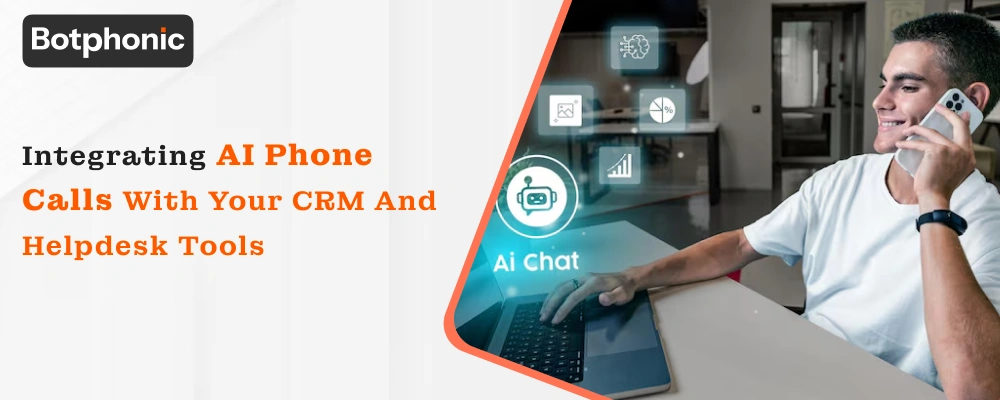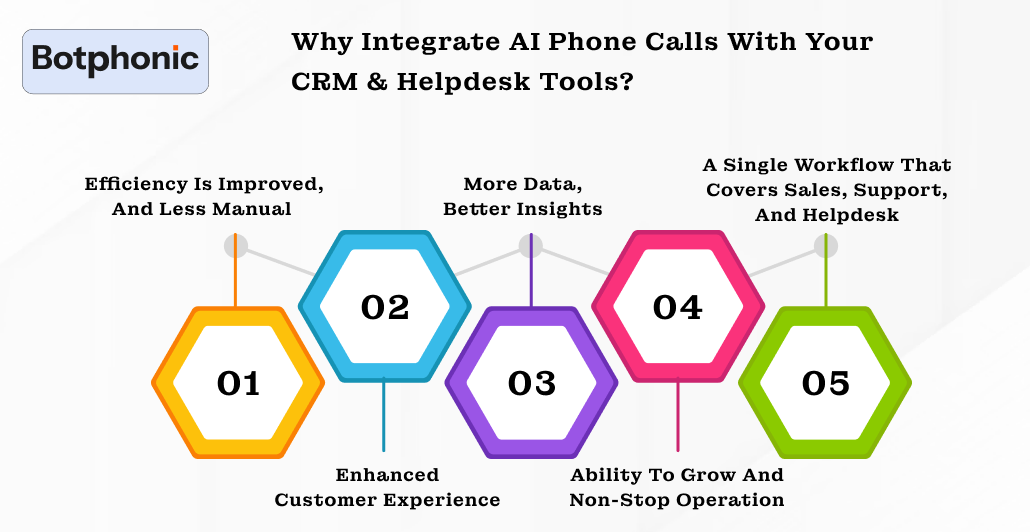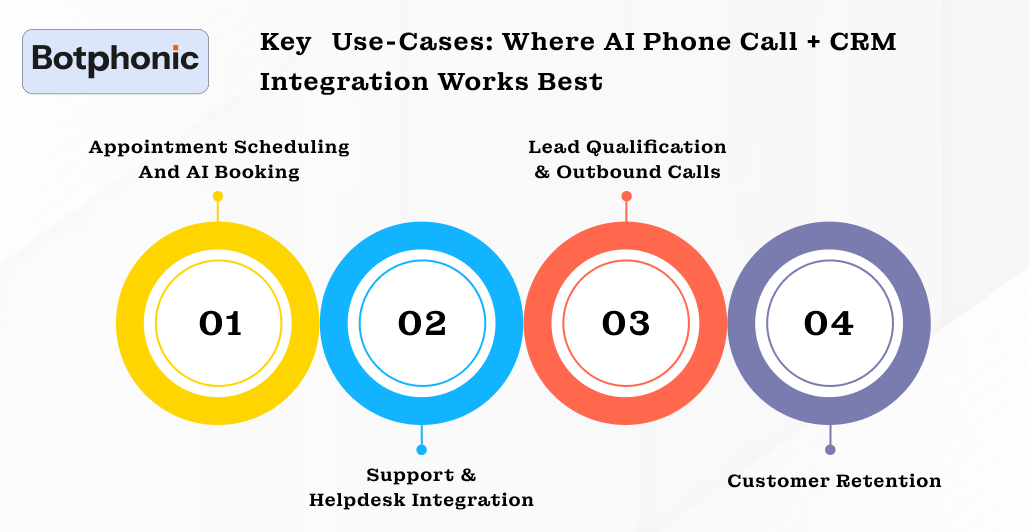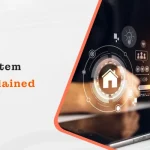
Summarize Content With:
Summary
This blog explains the integration of AI phone call solutions with your CRM and helpdesk tools. You can read about the benefits, main use cases, and the steps to a smooth setup (especially when using Botphonic AI).
Key Takeaways
- One of the benefits of integrating AI-powered phone calls with CRM is that it streamlines the data flow and reduces the manual workload.
- “AI call assistant” or “AI booking” are examples of systems that can handle calls, create schedules, and send data to CRM/helpdesk tools without requiring human intervention.
- The decision on the best integration and tech stack for achieving the desired outcome is crucial.
- If everything is properly arranged, you will be able to enhance customer experience, increase agent productivity, and thus your business will grow more easily.
Introduction
What if a situation like that happened: your business is waiting for a call from a potential customer. Your AI-assistant is the one that answers the call, and it even knows the caller, checks the CRM for the previous interactions, makes the appointment, and at the same time registers everything in the helpdesk too. It all takes just a minute.
There is no human waiting, no delay in data entry. Integrating AI phone call with your CRM and helpdesk means exactly that. In this blog, we explain how the system works. Why it is important, what signs indicate that you can do it, and how to actually accomplish it. Let’s figure all these out.
What Does “AI Phone Call Integrations CRM” Really Mean?
Our expression “AI phone call integrations CRM” refers to the connection of an AI-Powered Phone system (which can make or receive calls, transcribe, understand intent, schedule, or take action) to your CRM (customer relationship management) system and, if possible, your helpdesk/support tool.
The first paragraph describes the process in layman’s terms:
- One of the first things an AI call assistant can do is take the call or even make a call on its own behalf.
- Speech-to-text and natural language processing are the technologies used for understanding what the caller wants.
- The system identifies or records information about the caller in the CRM, including their identity, history, lead status, and other relevant details.
- The most significant changes are performed by the AI, including setting a helpdesk follow-up task, booking a meeting (via AI), updating contact record fields, creating a support ticket, and more.
Why Is This Good?
By eliminating manual data entry, you can respond more quickly, deliver a superior customer experience, and enhance the efficiency of your support and sales teams. Not only that, but you can also grow without the need for more staff. One review of a tool powering this functionality reads that “AI calling agents can integrate with CRM software, enabling them to update records, process payments, or confirm bookings in real-time.
Another piece of content points out the following: “Modern answering services sync caller details, transcripts and follow-up actions directly into your CR, automatic lead capture, and personalised customer interactions. Therefore, when you look up this issue, you will be presented with lots of vendors. However, our concern is only about how to successfully come to grips with this and how Botphonic AI is involved.
Why Integrate AI Phone Calls With Your CRM & Helpdesk Tools?

There are numerous advantages to linking AI-Powered Phone system with CRM and helpdesk tools. A seamless operation results from your telephone system, CRM, and support workflow being interconnected. These reasons are much more than just surface-level ones.
1. Efficiency is Improved, and Less Manual Work is Required
The AI call assistant, handling routine inbound or outbound calls, frees up the time of your team, allowing them to be less occupied with data entry. Thus, the AI performs the transcription of the call, identifies the key intent, and automatically updates the customer record in the CRM. So your agents’ time is focused on the tasks that bring in more value.
Moreover, this diminishes the chance of human errors (typos, missed follow-ups). One article about call-centre solutions states that contemporary platforms frequently provide ‘CRM and helpdesk integrations centralising communication channels’ as a method of increasing productivity.
2. Enhanced Customer Experience
Integration of AI with your CRM enables it to recognise customers who have visited before, greet them by name, refer to their previous interactions, and even route them accordingly. That personalised approach counts a lot.
Customers dislike repeating themselves. Through integration, both the AI assistant and the human agent have access to customer history. The platform of Botphonic AI points out that ‘human-AI conversation seems like human experience’ in calls.
3. More Data, Better Insights
This is because calls are logged, transcribed, sentiment analysed, and data is sent to your CRM/helpdesk, with which you are building a comprehensive dataset. You can measure the number of calls that resulted in booked appointments (AIi booking), the number that led to support tickets, and the number that got escalated.
Once everything is documented, it becomes possible to refine workflows. For example, the Botphonic article cites the use of feedback collection, conversation analytics and sentiment analysis.
4. Ability to Grow and Non-Stop Operation are Two Main Advantages
The only way to scale by using just human agents is to hire more people. A 24/7 operation is possible with an AI call assistant that has been integrated into the CRM and helpdesk (AI doesn’t require sleep). Botphonic claims 24/7 AI booking and call handling.
5. A Single Workflow that Covers Sales, Support, and Helpdesk
It is common for the sales teams to employ a CRM. The support team to use a helpdesk tool, and phone calls to be handled separately. The integration of the three, however, means the unification of both data and workflows. Consequently, a sales call that necessitates a helpdesk follow-up or a support call that uncovers a cross-sell opportunity can all be handled without the need for additional steps.
Key Use-Cases: Where AI Phone Call + CRM Integration Works Best

Why not explore concrete examples of use cases where the integration of an AI call assistant with CRM/helpdesk tools can be a game-changer? We will also discuss what these entail, why they are important, and how they can be implemented.
Use-Case 1: Appointment Scheduling and AI Booking
Which company is your business working with, or what types of services and products are you offering? For example, in a healthcare setting, as well as in salons, consultancies, and home services. Then, AI phone calls + CRM integration turn out to be a great solution. In this instance, the AI call assistant (AI phone call) receives an incoming call, and the customer states, “I want to reserve Thursday at 3 pm for my next appointment.”
AI will review calendar availability (through integration), set up the appointment, and create the customer or lead record in the CRM. It will also send a confirmation SMS/email and maintain a record of the booking. Additionally, if necessary, it will create follow-up tasks in the Helpdesk. Botphonic
Why it matters:
Sure enough, if not combined with manual interventions such as double-checking and confirmations, human errors creep in constantly throughout the day, and in the relentless pace of work, surely not only the workers but also the customers become very tired and frustrated. By integrating full systems, you can deliver a fast and error-free booking experience, thereby ensuring customer satisfaction and reducing non-attendance rates.
Use-Case 2: Support & Helpdesk Integration
What if a customer calls with an issue and only the AI assistant can provide an immediate response or routing? In addition to recognising the caller (via CRM), it also retrieves the info and records the call. Should the problem require a human agent. The AI automatically opens a ticket on your support platform, including the transcript, sentiment score, and related context. Botphonic indicates “ticket integration” as a feature of their CRM integration for the AI Voice Call Assistant.
Why it matters:
Reduces waiting time, ensures the flow of context, and enables the agent to begin with a comprehensive understanding. Correspondingly, service quality is also enhanced through FCR.
Use-Case 3: Lead Qualification & Outbound Calls
Outbound calling leads are definitely essential to the growth of any sales team. Can you point out which statement about an AI call assistant is correct? A first call by the AI or a human, and then a transfer? An agent is responsible for asking qualifying questions, while the CRM updates the records, e.g., lead status and interest level.
The machine recognises speech, records the call duration and summary. If the conditions are met, it marks the call “hot,” thus initiating the next workflow in CRM. Botphonic lists sales calls and cold calls as options.
Why it matters:
This is the main reason why human sales representatives can concentrate on cases where there are already potential leads instead of wasting their time on cold calling. The method of data capture becomes faster and smoother, thus, you get quicker responses times.
Use-Case 4: Customer Retention & Upsell via AI Booking & AI Call Assistant
It is easy with AI technology to reach out to a customer and inform them that their current plan is about to expire, that they have not used the service for a long time, and to remind them of the upcoming renewal. Utilising CRM history, the AI call connects the customer with the latest upsell and promotion, books the next session (AI booking), and tracks the conversation.
It helps you retain customers effectively. The Botphonic page refers to AI for upselling, reminders, and 24/7 support.
Why it matters:
Retaining customers is significantly less expensive than acquiring new ones. Automation of outreach through calls, combined with CRM and insights, is a timely solution that keeps you ahead in the game.
Why Choose Botphonic AI for Your AI Phone Call + CRM Integration?
We are creating content for the Botphonic AI website, so it would be logical to mention what makes Botphonic a good option for this integration.
- Botphonic defines itself as a “Smart AI-Powered Call Assistant” that can handle personalised calls, schedule automatically, update CRM software, record & summarise calls.
- It offers “AI booking” and real-time integration with CRM and calendar services.
- Integration capability: Enables connection to over 200 apps, including top CRMs (Zoho, Salesforce, HubSpot), and supports no-code workflows.
- Some of the features include sentiment analysis, conversation analytics, multilingual support.
Wouldn’t it be great if your AI call assistant was the one to handle new leads, book meetings, and keep customers happy, all while you were asleep?
Go ahead with your 14-day Botphonic AI trial without any charges, and let the smartphone call integrations with your CRM and helpdesk do the rest.
Try Botphonic AI NowConclusion
When combined with CRM and helpdesk tools, AI phone calls powered by artificial intelligence should no longer be considered merely “nice to have” features but rather the new standard of smart businesses. An AI call assistant booking (AI booking) leads qualification, call logging, and other tasks, freeing your team from monotonous tasks, elevating the customer experience to a higher level, and generating valuable data insights.
Platforms such as Botphonic AI offer the means to accomplish these tasks in the right manner: effortless CRM/helpdesk integrations, voice assistants that sound natural, analytics, and scalability. By implementing the steps we outlined, defining use cases, preparing the CRM, workflow mapping, choosing a platform, training/testing, and monitoring metrics, you will be able to set up a system that automates your business efficiently.
Do you see a reason for putting this off? Every call represents a potential opportunity. Why not let your AI call assistant grab it, make the most of it. Then sync it so your team will not lose the precious human interaction time?

